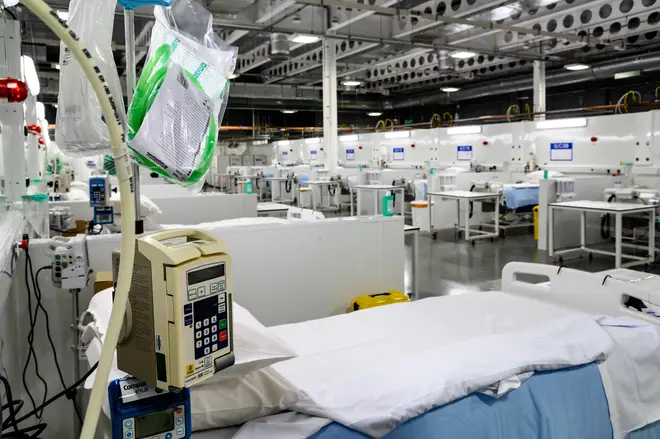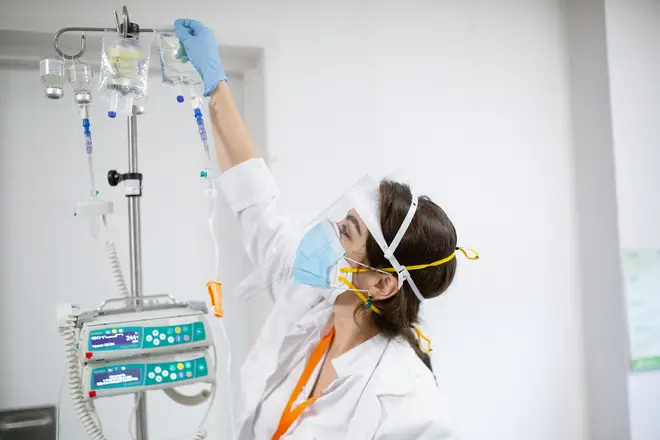
Nick Ferrari 7am - 10am
29 April 2020, 11:39

Almost 18,000 more people could die from cancer over the next year in England due to the impact of Covid-19, research suggests.
Delays in diagnosing new cancers and getting treatment for those who already have the disease could significantly impact survival, according to a study from University College London (UCL) and DATA-CAN, the Health Data Research Hub for Cancer.
Experts looked at real-time weekly hospital data for urgent cancer referrals and chemotherapy attendances during the coronavirus epidemic and found that the majority of patients with cancer or suspected cancer are not accessing health services.
When looking specifically at England and Northern Ireland, they found an average reduction in attendance for chemotherapy of 60% and a 76% average drop in cancer referrals for early diagnosis.
[For all the latest coronavirus news follow our live blog]
This was across three trusts in England - Leeds Teaching Hospitals NHS Trust, the Royal Free in London and University College London Hospitals - and all five health trusts in Northern Ireland.
When looking specifically at England and analysing data from more than 3.5 million patients, experts estimated that pre-Covid-19, about 31,354 newly diagnosed cancer patients would die within a year in England.

Matt Hancock on a new coronavirus condition that affects children
But as a result of coronavirus, they found there could be at least 6,270 extra deaths in newly diagnosed cancer patients - a rise of a fifth.
When all people currently living with cancer are included, the figure jumps to 17,915 excess deaths.
The paper also looked at the US and estimated 33,890 extra deaths in the US in newly diagnosed cancer patients over the next year.
Senior author Professor Harry Hemingway, director of the UCL Institute of Health Informatics, said: "The overall impact of the Covid-19 emergency on deaths in cancer patients could be substantial.
"There are many factors operating here, including rapid changes to diagnosis and treatment protocols, social distancing measures, changes in people's behaviour in seeking medical attention and the economic impact of Covid-19, as well as deaths due to Covid-19 infection."

Listen & subscribe: Global Player | Apple Podcasts | Google Podcasts | Spotify
Responding to UCL and DATA-CAN research that reveals deaths in people with cancer in England could rise by at least 20 per cent, Lynda Thomas, Chief Executive at Macmillan Cancer Support, said: “This research shows the possible extent of the direct and collateral damage caused by coronavirus on the health of our nation and to the lives of people living with conditions like cancer.
"It’s extremely worrying that we are likely to see an increase in deaths of people newly diagnosed with cancer. Macmillan cannot urge people strongly enough to contact their GP if they are concerned about the signs of the disease, so there is no delay to their diagnosis and treatment.
“That’s why we are calling on all governments to stop cancer becoming the forgotten ‘C’ and urgently ensure cancer services are getting everything they need to recover and catch up as quickly as possible from the disruption of the pandemic.
"This means having the right staff, protective equipment and testing to deliver safe care”.
Professor Mark Lawler, scientific lead at DATA-CAN, said: "We believe countries need to rapidly understand how the emergency is affecting cancer outcomes, otherwise we risk adding cancer and other underlying health conditions to the escalating death toll of the Covid-19 pandemic."
The research found that almost eight out of 10 of the extra deaths occurring among cancer patients were in people also suffering from conditions such as heart disease, high blood pressure, obesity and diabetes.
Sarah Woolnough, Cancer Research UK's executive director of policy and information, said: "It's devastating to see the impact that Covid-19 is already having on the lives of cancer patients, and these new figures highlight a concerning picture for projected cancer deaths.
"We can only estimate how many avoidable deaths there might be based on a number of assumptions, but if the Government acts now, they can prevent more lives being lost.
"The sooner we have adequate testing for all NHS staff and patients, including those without symptoms, the sooner Covid-free cancer hubs can diagnose and treat cancer effectively, and patients can be reassured it's safe to go to hospital.
"And by ensuring there's enough staff and kit to work through the growing backlog of patients, the better equipped the NHS will be to deliver vital cancer care."
The study comes as England's top cancer doctor urged people to get checked if they are worried about any symptoms.
A poll found one in 10 people would not contact their GP even if they had a lump or a new mole which did not go away after a week, while a third are worried about seeking help during the epidemic.
Professor Peter Johnson, the NHS clinical director for cancer, said failure to get help could have serious consequences for patients and put a greater burden on the NHS.
He pointed to "Covid-free cancer hubs" set up to provide surgery, while independent sector hospitals have signed a deal with the NHS to offer treatment.
Prof Johnson said: "NHS staff have made huge efforts to deal with coronavirus but they are also working hard to ensure that patients can safely access essential services such as cancer checks and urgent surgery.
"From online consultations to the roll-out of cancer treatment hubs, we are doing all we can to make sure patients receive the lifesaving care that they need.
"The wishes of patients and their families will always come first, and we have to make sure that people feel safe coming to hospitals, but my message is clear: people should seek help as they always would.
"We know that finding cancer early gives us the best chance to cure it, and ignoring potential problems can have serious consequences now or in the future."
Natalie Haskell, chief executive of breast cancer charity CoppaFeel!, said: "Breast cancer is very treatable if found early and we urge people to listen to the NHS and continue to seek out their GP as normal if they are concerned about symptoms."
Anna Jewell, chairwoman of the Less Survivable Cancers Taskforce, which represents those affected by lung, liver, brain, oesophageal, pancreatic and stomach cancers, said: "People diagnosed with these cancers already have heartbreakingly poor survival rates but treatment can add precious months or years to their life expectancies.
"We want to emphasise the message that the NHS is open and there for people with concerning new symptoms not linked to Covid-19."